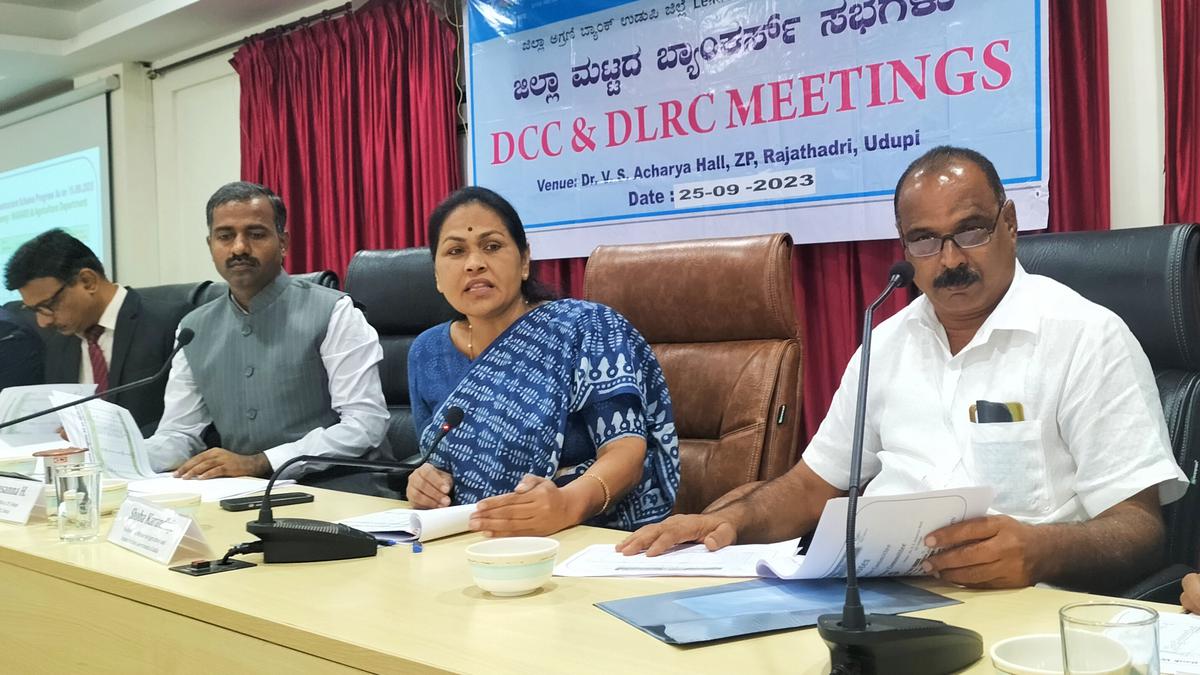
Shobha Karandlaje asks banks to prioritise lending to food processing and allied industries in Udupi district
The Hindu
Union Minister of State for Agriculture and Farmers’ Welfare Shobha Karandlaje on Monday directed banks in Udupi district to give priority in lending for food processing and similar other industries that generate more employment
Union Minister of State for Agriculture and Farmers’ Welfare Shobha Karandlaje on Monday directed banks in Udupi district to give priority in lending for food processing and similar other industries that generate more employment.
Presiding over the district-level consultative committee and review committee for banking development at Rajatadri, district office complex in Manipal-Udupi, Ms. Karandlaje told banks to ensure their employees be people-friendly. Applications seeking financial aid under government schemes should be disposed off as per the extant rules without any delay, she said.
Jurisdictional bank branches should display the procedure to avail financial assistance for government schemes in each gram panchayat so as to help the beneficiaries. Officials should work had to promote agri-based industries and enterprises, the Minister said. Despite the district producing good quantity of marine products, they get exported from neighbouring Kerala, she said asking banks to finance fish processing units in the district.
Zilla Panchayat CEO H. Prasanna informed the meeting that the total banking business has grown to ₹52,675 crore registering a 9.08% year-on-year growth (₹4,386 crore). Banks have registered 108% growth in Pradhan Mantri Udyog Srujan Yojana by lending ₹20.41 crore to 187 persons as against the target of 173 persons. Udupi is in first place by lending loans to 4,162 persons as against 2,819 street vendors under the PM Svanidhi Scheme, Mr. Prasanna said.
Canara Bank Udupi Regional Manager K. Sreejith said the bank lending has improved to ₹17,041 crore with a net increase of ₹1,192 crore from the previous year, a growth of 7.52%. Bank deposits have grown to ₹35,635 crore with a net increase of ₹3,195 crore, registering 9.85% growth.
A. Kiran Kumar Kodgi, Kundapur MLA, Gururaj Gantihole, Byndoor MLA, and others were present.

“Writing, in general, is a very solitary process,” says Yauvanika Chopra, Associate Director at The New India Foundation (NIF), which, earlier this year, announced the 12th edition of its NIF Book Fellowships for research and scholarship about Indian history after Independence. While authors, in general, are built for it, it can still get very lonely, says Chopra, pointing out that the fellowship’s community support is as valuable as the monetary benefits it offers. “There is a solid community of NIF fellows, trustees, language experts, jury members, all of whom are incredibly competent,” she says. “They really help make authors feel supported from manuscript to publication, so you never feel like you’re struggling through isolation.”

Several principals of government and private schools in Delhi on Tuesday said the Directorate of Education (DoE) circular from a day earlier, directing schools to conduct classes in ‘hybrid’ mode, had caused confusion regarding day-to-day operations as they did not know how many students would return to school from Wednesday and how would teachers instruct in two modes — online and in person — at once. The DoE circular on Monday had also stated that the option to “exercise online mode of education, wherever available, shall vest with the students and their guardians”. Several schoolteachers also expressed confusion regarding the DoE order. A government schoolteacher said he was unsure of how to cope with the resumption of physical classes, given that the order directing government offices to ensure that 50% of the employees work from home is still in place. On Monday, the Commission for Air Quality Management in the National Capital Region and Adjoining Areas (CAQM) had, on the orders of the Supreme Court, directed schools in Delhi-NCR to shift classes to the hybrid mode, following which the DoE had issued the circular. The court had urged the Centre’s pollution watchdog to consider restarting physical classes due to many students missing out on the mid-day meals and lacking the necessary means to attend classes online. The CAQM had, on November 20, asked schools in Delhi-NCR to shift to the online mode of teaching.









